A New Circular Strategy: Gap Stitches Hopes on the Clothing Resale Market
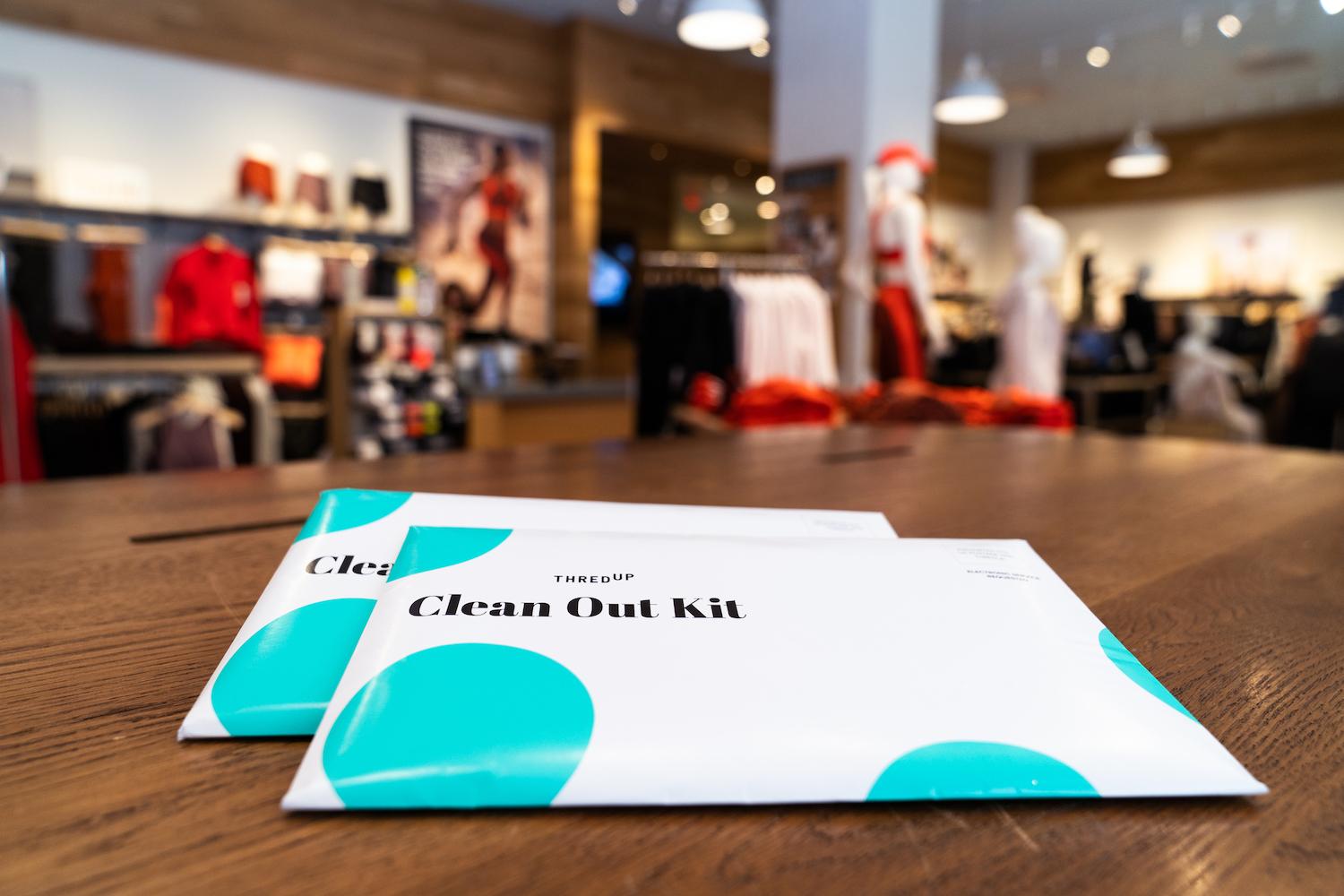
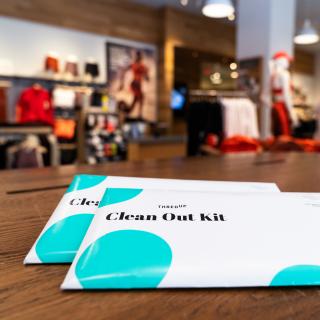
In the years following the financial meltdown of 2008, researchers tracked a significant upswing in secondhand purchases by cost-conscious consumers. The economic incentive to buy used clothing has abated since then, but other factors are going strong.
Ethical and environmental concerns, consumer interest in hunting for unique and unusual items, and the ease of online shopping are all adding more fuel to the resale fire. Now Gap, Inc. and other leading retailers are beginning to embrace the opportunity to realize bottom-line benefits from the clothing resale market, which can bolster their corporate responsibility profiles, too.
Gap partners with ThredUP to promote reuse and resale
Dipping into the resale field may seem counterintuitive for a retail brand. However, it may offer retailers an opportunity to attract new consumers and cement ties with existing fans in ways that conventional textile recycling does not.
For example, last week Gap announced a promotional partnership with the leading online clothing resale company ThredUP, to begin in April. Under the agreement, Gap will make ThredUP’s colorful “Clean Out” shipping bags or labels available at select stores, including Gap, Banana Republic, Athleta, and Janie and Jack.
The Clean Out bags are a key part of ThredUP’s strategy for attracting sellers in the increasingly competitive online resale market. The company provides both the bags and the shipping, making it easy and convenient for sellers to bundle up their unwanted items and send them off.
On its part, Gap will benefit from ThredUP’s seller incentive policy. ThredUP sellers can earn cash or credit, and those using credits will earn a 15 percent bonus if they redeem them at any of the participating Gap, Inc. brands.
Tackling the clothing waste problem
For shoppers who are increasingly aware of ethical and environmental concerns, the credit redemption and bonus incentives could help take some of the sting out of buying new items.
The partnership with ThredUP could also help Gap offset a thorny waste management problem. In its recent sustainability report, Gap, Inc. took note of the challenge of recycling waste from its retail stores. The company set a 2020 goal to divert more waste away from landfills, but it does not have direct control over waste management at three-quarters of its retail sites, instead dealing with a patchwork of different landlords and waste management companies.
Gap has worked with some of its largest landlords to improve recycling, but the solutions are slow to arrive. In the meantime, the company moved to redesign packaging use and reduce waste at the source.
That leads to another potential problem, in that package redesign can be a fraught and risky endeavor for a brand. However, the ThredUP partnership provides an opportunity for Gap to enlist consumers as supporters of the effort.
The clothing resale market: The numbers add up
The ThredUP partnership also enables Gap to position itself as a solution-seeker for a problem of eye-popping proportions that extends far beyond its retail operations.
According to one estimate, the average U.S. consumer throws away about 80 pounds of clothing annually. Only 15 percent is recycled, even though almost 100 percent of all textiles are potentially recyclable.
ThredUP has calculated that if all consumers substituted just one used item for a new purchase in a single year, the savings would amount to almost 6 billion pounds of carbon emissions or the equivalent of taking half a million cars off the road. Other statistics cited by the company include the potential for saving 25 billion gallons of water, 11 billion kilowatt-hours of energy and 449 million pounds of waste.
More retailers pin hopes on the clothing resale market
CNBC took a deep dive into the resale clothing market last week. As described by reporter Lauren Thomas, there is “no verdict yet” about the raw bottom-line benefits of resale ventures for leading retailers.
Nevertheless, activity in this sector has stepped up in recent months. Macy’s, J.C. Penney, and the Madewell brand of J. Crew are all testing pop-up shops curated by ThredUP at select stores. Last month Nordstrom also launched its own resale shop, online and onsite at its New York flagship store.
Analysts expect the resale market to continue growing. It stands at 6 percent of the total U.S. clothing and footwear industry currently, and Thomas cites a Wells Fargo analyst who foresees an increase to 10 percent within the next two years.
That could prove to be an underestimate, as a confluence of factors come together. In addition to increased ethical and environmental awareness, the financial factor may soon loom large again. Some top-line employment figures in the U.S. indicate a healthy consumer base, but other economic indicators — including the cost of housing, health care, student debt, childcare and transportation — reveal a much more complex retail picture, one in which consumers are cutting back where they can.
The resale numbers appear to support this trend. Last spring, ThredUP released its seventh annual resale report with the firm GlobalData Retail and found a significant upswing in resale interest among women. According to their data, 56 million women bought secondhand items in 2018, representing a substantial increase of 27 percent from the year before.
The prospects for sales growth are also good. The report surveyed resale shoppers and found that at least half of them plan to increase their resale buying in the coming years. It will be interesting to see what next year's sales report will bring.
Image credit: Gap, Inc. via Business Wire
Yes, EVs Are Better for the Planet, Even If They're Charged With Dirty Energy


Critics often argue that because electric vehicles are often powered by electricity produced at coal-fired power plants and other fossil fuel facilities, they aren’t necessarily any cleaner than gasoline-powered cars. Their logic is that while all-electric cars do not emit carbon dioxide from the tailpipe, they are still responsible for significant emissions during recharging.
On a recent China Global Television Network episode of “The Heat,” panelist Tu Le, managing director of the strategic advisory Sino Auto Insights, agreed with that logic, to a point. In the short term, Le said, the arguments that EVs produce their own form of emissions may be true. However, he—like many others before him—predicted that carbon emissions resulting from electricity production will decline in the future. “In the next 15 to 20 years, as energy storage becomes more mainstream, and solar and alternative forms of energy become mainstream, that [criticism] becomes less relevant,” he explained.
Other analysts, including Jeremy Hodges of Bloomberg, have made the case that EVs still run cleaner than gasoline- or diesel-powered vehicles in the long run, even when they're directly powered by a coal-fired power plant.
The EV critics’ double standard
Further, the characterization that EVs alone are responsible for heavy emissions during recharging is not an accurate critique, some experts say.
David Reichmuth, a senior vehicles engineer with the Union of Concerned Scientists, points out the double standard sometimes applied to evaluating emissions from fuel production. Gasoline-powered vehicles, too, can’t just be assessed at the tailpipe. Vehicles with conventional internal combustion engines (ICEs) are also responsible for emissions during crude oil extraction, the refinery process and their transportation to filling stations.
When assessing the true emissions of each vehicle type in a state-by-state study, Reichmuth found that driving the most inefficient EV still resulted in fewer emissions than any gasoline car on the market, in almost every state. In upstate New York, for example, the difference was extreme: Electric vehicles produced one-tenth of an average ICE vehicle’s emissions.
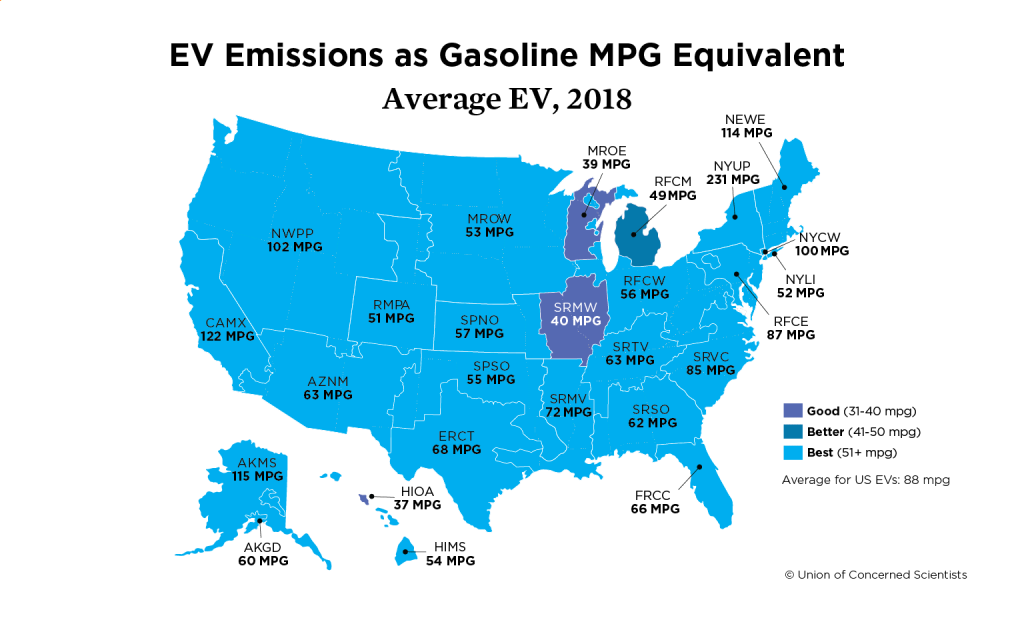
Image courtesy UCS
As the map above shows, your average, run-of-the-mill electric vehicle beats out a gasoline-powered car in nearly every state when it comes to fuel efficiency. Only parts of Minnesota, Illinois and Missouri were able to deliver fuel to gas-powered vehicles efficiently enough for ICE cars to match the 39 to 40 MPG equivalent of EVs.
EV efficiencies are just warming up
As Le pointed out in his segment on “The Heat,” electric vehicles are only going to become more energy efficient in the future.
Reichmuth’s UCS report highlighted a number of factors driving this rise in efficiency. From 2018 to 2019, the proportion of Americans living in a region where EVs can unlock greater than 50 MPG fuel efficiency surged from 45 percent to 94 percent. Similarly, as of 2018, EVs emit less than conventional 50 MPG vehicles in 22 of the 26 major electricity grid regions in the U.S., up from nine in 2009.
Meanwhile, electricity sources throughout the U.S. are trending toward lower emissions: From 2009 to 2018, the use of coal for energy declined sharply, from 45 percent of the U.S. energy mix to 28 percent. Meanwhile, the total amount of power sourced from solar and wind power technologies rose from 2 percent to 8 percent.
Can we have our SUVs and electric vehicles, too?
SUVs have long been the subject of criticism for their fuel inefficiency and contribution to emissions, but do they need to go down in history strictly as gasoline hogs and emissions chart toppers? Not necessarily. After all, larger EVs are already hitting the market.
While these larger EVs are less efficient, they only emit 25 percent to 50 percent of the carbon dioxide their gasoline-powered peers do, Reichmuth found.
Meanwhile, based on regional supply chains, the most inefficient all-electric SUV, the Audi e-tron EV SUV, performed much better than the automaker’s ICE version. After crunching the numbers, Reichmuth found that when comparing Audi’s gasoline SUV to the all-electric model, the EV halved emissions for 8 percent of the U.S. population. Almost three-quarters of the population would see emissions savings from 50 percent to 75 percent by swapping their Audi SUV for an all-electric model, and nearly a fifth would realize savings in excess of 75 percent.
While not every American can afford an Audi SUV, whether it is gasoline-powered or all-electric, the data nonetheless presents a clear picture of reality, both today and in the future: Switching to electric vehicles results in lower carbon dioxide emissions. Watch for the performance of these vehicles to improve as automakers, from GM to Volkswagen, roll out new all-electric models and introduce new technological innovations. Those emissions savings will only become more efficient as time goes on.
Image credit: Audi
Wastewater is a Source of Valuable Water, Energy and Nutrients: How Do We Recover It?


(Image: Filtration ponds at a wastewater treatment facility.)
In a study released last month, United Nations University’s Institute for Water, Environment and Health found that large amounts of water, nutrients and energy are being flushed away, as it were, in the world’s wastewater streams. Globally, we produce wastewater amounts equivalent to about five times what passes over Niagara Falls in a year. Contained in all that wastewater is enough energy to power all the households in the U.S. and Mexico, enough nutrients to meet 13 percent of global fertilizer needs, and enough water to fill Lake Ontario in four years, according to the study.
Those are staggering figures, but there are some next-step takeaways from the study that should not be overlooked.
We need more and better wastewater data
The study authors acknowledge that even with the impressive numbers they have compiled, data on wastewater is inconsistent or, in some cases, unavailable. This is a recurring problem in the water sector. A lot of assumptions have to be made because the data simply does not exist or is incomplete.
There is inadequate data on water in both developed and developing regions and at every level of the system, including leaks and losses, infrastructure, policy, quality, and more. To make better decisions, policymakers need more complete and accurate data. One of the ways better data can be gathered is through the deployment of smart water management, including smart water grids—which, like smart appliances or smart electric grids, can more accurately pinpoint flows, leaks and weaknesses.
Management and recovery should be better integrated
There’s a saying in the energy-efficiency world that the longest distance is that between the boiler room and the board room. In other words: What the people at the data and operations level know is not necessarily what is talked about in the executive suites of utilities and cities.
Further, in cities in particular, sectors may be siloed, creating more inefficiencies. For example, a city may manage its water, energy and food issues under different jurisdictions that do not coordinate. Better integration would mean that, when addressing wastewater issues, relevant conversations could be had about withdrawing nutrients to help with agriculture or the development of biogas capture.
For example, the city of San Antonio, Texas, which utilizes municipally-owned water and electric utilities, has high-level coordination of the two sectors. Its Crouse Water Recycling Center is an example of their collaboration: In addition to providing 115 million gallons of recycled water daily, it also generates 1.5 million standard cubic feet of natural gas daily, and 80 percent of the resulting biosolids are processed for use as compost.
Policy and innovation go hand in hand
Smart water technologies continue to advance, but there is still more that needs to be done to develop net-zero energy and energy-positive technologies in the water and wastewater sector. All the innovation in the world will not be worth anything, however, if policymakers and industry leaders do not undertake the necessary changes to implement them.
Often the barrier to solving water problems is the lack of political and economic will, not a limitation in technology. Pay Drechsel of the International Water Management Institute in Sri Lanka, and one of the study’s authors, noted: "For countries to progress, there is a need to invest in a supportive regulatory and financial environment toward a green economy, and to leverage private capital for resource recovery related business models that are financially feasible and increase cost recovery from municipal wastewater.”
Innovation can provide the proof that pushes policymakers and business leaders to see the benefits of looking at the entire system. Wastewater is well situated to offer a case in point. Take, for example, this textile mill in India, which needed a solution to a messy problem. The plant’s wastewater contained elevated levels of dissolved solids, even after two rounds of treatment. Downstream farmers went to the government about the resulting waterway pollution, but the most obvious fix —a thermal water treatment system— was an expensive proposition for the textile mill.
Tina Arrowood, a principal research scientist at DuPont Water Solutions, worked with the mill to innovate a new system that made more economic sense. Based on proven reverse osmosis technology, the system her team created isn’t just cheaper — it’s also more robust and effective than thermal methods: The plant was able to recover more than 90 percent of the water for operational reuse, reducing the need for freshwater withdrawals, and recycle the salts for resale.
“Technology companies can learn from industries on the ground to create tailor-made solutions to problems,” Arrowood told us. “Creating a circular economy in water-stressed regions can then help pay for systems” like the one used at the textile mill.
Innovations like these show proof of concept that can push policymakers to support creative responses to tough water problems. The U.N. University study presents some impressive figures, and there is every reason to believe we should be able to take that data and do something meaningful with it. As our cities continue to grow and climate change advances, the pressures on our water supplies will increase. Innovative policy and economic solutions are already here for the taking.
This article series is sponsored by DuPont Water Solutions and produced by the TriplePundit editorial team.
Image: Ivan Bandura/Unsplash
No Shame, No Stigma: Ending the Mental Health Taboo


The following conversation about mental health is an excerpt from Cisco’s 2019 CSR Report. To find out more, read the full report here.
We want everyone to know that it’s okay to not be okay. Cisco is changing the conversation about mental health issues within our company.
Over the past year, Cisco has made it a priority to not only end the taboo against talking about mental health, but encourage people to ask for help. It all started with an email. In 2018, in the face of growing concerns about mental health in society, Cisco CEO Chuck Robbins sent an email to all Cisco employees. In it, he expressed Cisco’s concern for those who are struggling, sharing that no one needs to go it alone. The response was overwhelming. Robbins received more than 100 replies from employees saying thanks and sharing stories of themselves and their loved ones. Since then, even more people have courageously spoken about personal struggles in company blog posts and the Cisco Beat. This response has awakened us to an issue that wasn’t being addressed.
Consider the statistics: about one in five U.S. adults lives with a mental health condition. Yet many people are still uncomfortable talking about these issues. Cisco is breaking the silence. We want everyone to know that it’s okay to not be okay. By decreasing the stigma and broadening the resources we offer, we hope to encourage people to get the help they need. And change the conversation about mental health across our industry.
Here are some ways Cisco is increasing awareness
- The Safe to Talk community on Cisco’s intranet includes videos, links to internal and external resources, and employee stories
- On Leader Day, we trained leaders across Cisco on how to recognize signs of mental illness and support their teams
- Our CEO has written, spoken, and tweeted publicly about the importance of this issue
- In the U.K., mental health “first aiders” help fellow employees access resources
Mental health initiatives
- Improving access to care in our largest U.S. medical plans. Employees will now pay the same coinsurance, whether they go in or out of network for mental health treatment.
- Offering confidential 24/7 visits with counselors as part of our global Employee Assistance Program, and in-person visits in our LifeConnections health centers. We increased the number of free visits to 10 in the U.S. to align with what we offer globally.
- Continuing our support as founder of Connected North, which uses Cisco collaboration technology to deliver mental wellness programming to remote, underserved communities in Canada.
Plans for every family
Cisco’s global benefits are designed to support employees and their loved ones through all stages of life. Our comprehensive benefits package includes medical, dental, and vision plans; disability coverage; and life insurance to help employees stay healthy and secure their families’ well-being.
Caring for one’s health can also mean having someone to talk to who can offer advice and support. Our global Expert Medical Opinion program offers peace of mind in the face of a major medical diagnosis or treatment decision, including those related to mental health. A simple phone call connects employees and eligible family members, including parents and in-laws, to a leading physician in the specialty they need for an expert second opinion at no cost to them.
Similarly, our global Employee Assistance Program helps employees and families better manage family issues, relationship struggles, financial issues, anxiety, stress, and more. Visits are free and confidential. As of October 2019, we increased the number of covered visits in the U.S. from eight to 10 sessions per concern, in alignment with what is available globally. Employees pay the same coinsurance for in- or out-of-network mental health treatment, should they need additional care, through our largest medical plans.
Mental health is health and Cisco aims to treat it that way.
Read more in Cisco's 2019 CSR report.
Previously published on Cisco's blog and the 3BL Media Newsroom.
Image credit: Pixabay
Report: Apparel Brands Warm to Sustainable Cotton, But There's More Work To Do
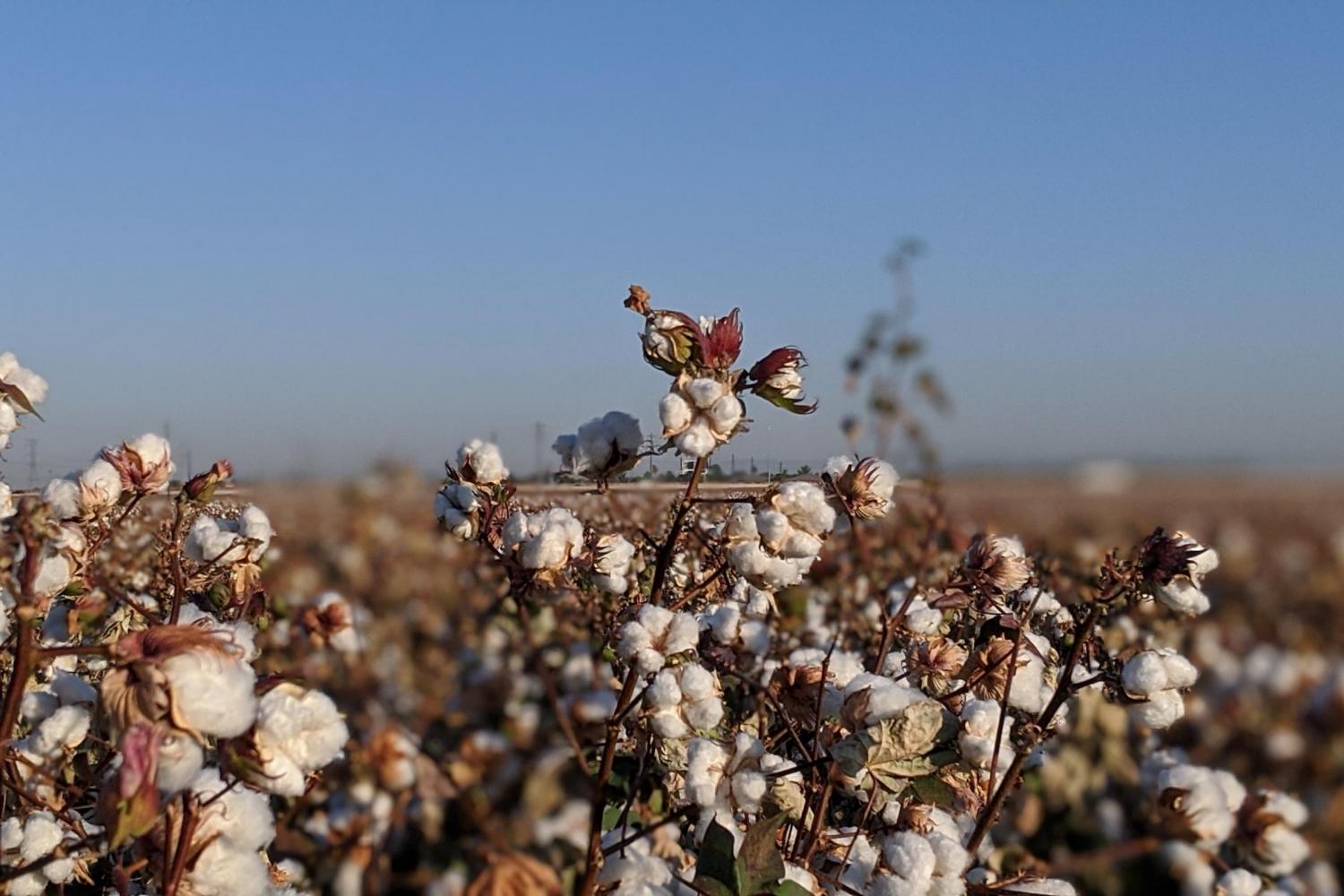
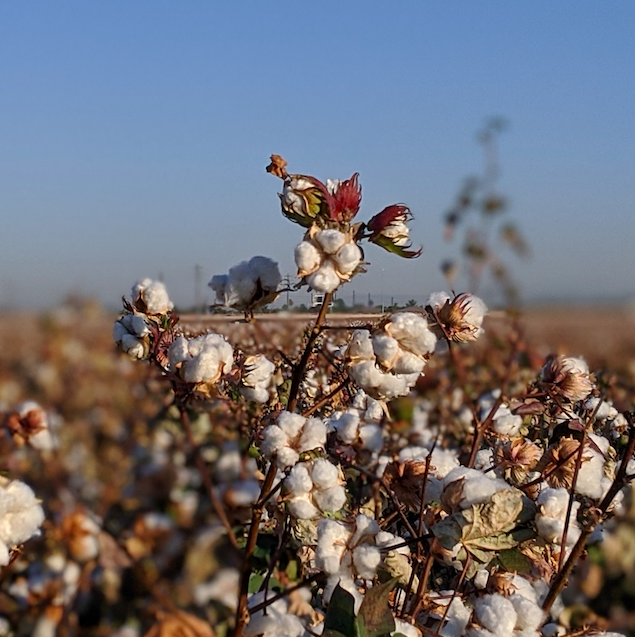
In the world of sustainable cotton procurement, the outlook for more responsible sourcing of this fiber is improving. The third global Cotton Ranking Report, led by the World Wildlife Fund, Pesticide Action Network U.K. and Solidaridad, assessed 77 companies for their cotton sourcing practices. They identified 11 companies as leaders in sustainable sourcing, which is more than doubled from just five in 2017. Adidas, Ikea and H&M topped the list.
This latest ranking confirms the conclusions of other organizations, which have shown an increase in the procurement of more responsible cotton over the past decade.
Higher scores, yet improvement still needed
The ranking shows that most companies with some commitment to more sustainable cotton are progressing on a range of environmental, social and governance (ESG) challenges. There is improvement across the board on policy, traceability and uptake. More companies are increasing their consumption of sustainable cotton, and responsible cotton sourcing has become a more important part of the apparel industry’s supply chain overall, the organizations found. A total of 43 companies obtained higher scores than in 2017, including 24 moving up from one performance category to the next, among them Walmart and Target.
Despite all of the progress, there is more work to do, the report concludes. Existing progress is driven mainly by companies that were already engaged to some extent in 2017. The brands that received low scores in 2017 have remained inactive on sustainable cotton sourcing for the most part. A third of all the assessed companies — including Amazon and Foot Locker — have no policy on cotton sustainability at all, while more than half of all assessed companies have not disclosed any public target for sourcing more sustainable cotton.
Why sustainable cotton rankings are critical to the apparel sector
Cotton is the most widespread non-food crop in the world. Its production provides income for over 250 million people and employs nearly 7 percent of all labor in developing countries. About half of all textiles are made from cotton.
But conventional cotton poses numerous environmental challenges. While cotton fields make up just 3 percent of the world’s cultivated land, they account for 24 percent of global insecticide use. These insecticides often end up in groundwater and rivers, with the result that these chemicals eliminate not only pests, but also the natural enemies of pests, which interferes with ecosystems.
Cotton is also a water-intensive crop: Estimates vary, but the Better Cotton Initiative (BCI) estimates that it takes 10,000 liters of water to produce 1 kilogram of cotton fabric.
Furthermore, producing the synthetic fertilizers used in cotton farming accounts for about 1.5 percent of the world’s annual energy consumption. Continuing to apply nitrates on farmland produces nitrous oxide, a greenhouse gas with a warming potential 300 times that of carbon dioxide. Additionally, soils sequester carbon, and when the soil is degraded, one result is that more carbon ends up in the earth’s atmosphere.
The social impact resulting from producing more sustainable cotton
Conventional cotton also produces socio-economic challenges. Poor working conditions are all too common, along with child labor and forced labor. Using pesticides and synthetic fertilizers has led some critics to say that the results lead to farmers racking up high amounts of debt.
The organizations backing the Cotton Ranking Report hope to accelerate the demand and uptake of sustainable cotton among clothing and home-textile retailing companies. The good news is that sustainable cotton increased to 21 percent of global production during the 2017-2018 season, up from 12 percent in the 2015-2016 season.
Change has been incremental, but considering how much cotton is produced worldwide, this outcome matters: The amount of sustainable cotton sourced by brands and retailers increased from 21 percent of the available supply in 2016 to 25 percent in 2018. That uptick may seem small, but the resulting volume makes a huge difference for cotton producing communities worldwide, who can earn a higher price for sustainable fibers. Yet that still leaves a full 75 percent of more sustainable cotton being sold as conventional cotton in the marketplace due to lack of demand.
Still, increasing the production of sustainable cotton can dramatically decrease the impact of the apparel sector by addressing the environmental and socio-economic challenges of conventional cotton farming. Reducing the water used in irrigation helps water-scarce regions avoid shortages for basic human needs. Eliminating or lessening the use of pesticides reduces the chemicals in drinking water sources and makes cotton farms safer places to work. Soil health improves when alternatives to synthetic fertilizers are used. Higher incomes for cotton farmers and their workers can help reduce poverty.
Or as CottonUp, a guide to sourcing sustainable cotton, states, “By sourcing sustainable cotton, businesses can help dramatically reduce some of the negative environmental impacts of the apparel sector and create positive benefits for millions of farmers and communities.”
Image credit: Fred Moreno/Unsplash
In Brazil, Solar Generates Secure Energy and Social Impact
As climate change impacts surge around the world, no country is immune. But Brazil, home to more than half of the Amazon rainforest, is on the frontline. The largest country in South America is confronting a wide range of challenges as the government’s stance on forests exacerbate climate change risks. Deforestation is on the rise in Brazil as 2019 saw the number of fires in the Amazon increase by more than 30 percent from the previous year.
The Amazon plays an important role in Earth’s climate system. These forests recycle water to maintain rainfall and drive atmospheric cycles in the region. They also absorb around 5 percent of human-made carbon dioxide emissions, making it a critical carbon sink in the global fight against climate change.
Droughts are threatening Brazil’s energy portfolio
In 2017, Brazil supplied 78 percent of its electricity with renewable sources (compared to the U.S., where only about 17 percent of electricity comes from renewable sources), but 61 percent of that electricity came from hydropower. Over the past decade, the country has suffered some of its worst droughts in history, threatening the viability of hydropower as well as exacerbating already high levels of economic disparity and social unrest.
As a result of these droughts, the country’s recent 10-year energy plan seeks diversification in energy sources. Although the plan calls for maintaining current hydropower levels, it also seeks to increase Brazil’s capacity of solar, in particular with a goal for the mix to reach 28 percent non-hydro renewables by 2027.
But this energy plan is coming about in the middle of a presidential administration in Brazil that resists taking action on climate change. President Jair Bolsonaro has accused environmental advocates of starting the Amazonian fires and argued that conservation efforts hinder development. If he means loggers are not able to do their job due to conservation efforts, that is sometimes true, but if the rainforest is decimated, there will not be any work for them to do at all. Further, this stance puts the country’s resources, and electricity supplies, at risk: Of Brazil’s freshwater sources, 70 percent come from the Amazon region.
Solar in Brazil can strengthen communities
Solar photovoltaic (PV) technology uses little to no water to generate electricity, making it a good option when trying to balance all of Brazil's complicated issues related to climate change. But one factor that has to remain uppermost in any policy is addressing the country's stark economic inequality, made worse by its recent recession.
Too many Brazilians do not have access to proper sanitation, clean water or reliable energy — in fact, about 4 million Brazilians lack access to safe drinking water. This vulnerable population already disproportionately suffers the effects of poor air quality. In turn, these communities risk greater susceptibility to diseases as they are mired in unsanitary and unhealthy conditions. Exacerbating this linkage, poor health leads to greater stress on the economy overall, making this challenge one that involves the nexus of the environment, health and economics.
Solar: A solution generating power and social impact
More emphasis has been placed recently on the economic equality opportunities that could result from deploying more solar in Brazil. One company, Faro Energy, has created a sustainable bond in Brazil to fund both solar power and community projects in rural areas. The project aims to develop educational programs at a public school next to a 6,385 megawatt-hour solar farm — which, according to Faro, is equivalent to the amount needed to power about 3,600 Brazilian homes.
Having a direct positive social impact is important when investing in clean energy technologies, especially in areas where people face disadvantaged economic situations. Beyond these direct kinds of investments, solar deployments — if designed well — could lead to other benefits such as job creation, grassroots development and entrepreneurship, and women's empowerment, advocates have observed.
Climate change presents many complexities, no more so than in places like Brazil, but the deployment of clean technologies such as solar power can help address social and environmental problems while generating safe and secure energy. Comprehensive, purpose-driven investment portfolios and innovative energy and environmental policies are necessary to tackle climate change. Brazil has a lot on the line, but it also has unlimited opportunities.
Image credit: Faro Energy
Food Waste is the Secret Ingredient in this Household Cleaner
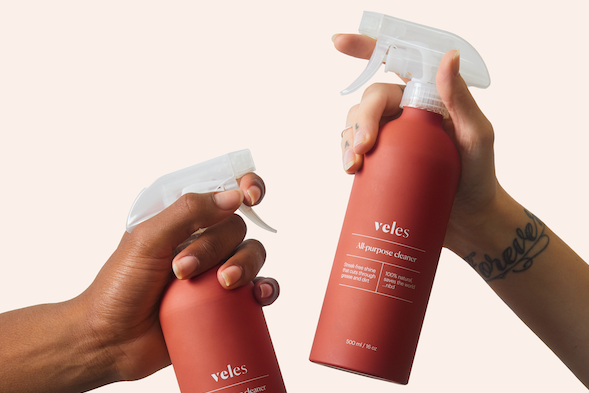
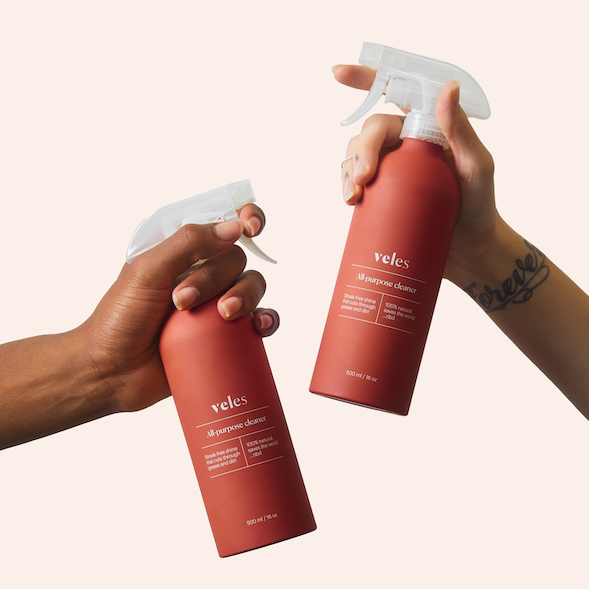
Food waste is the single largest contributor to American landfills, with estimates suggesting it accounts for 20 percent of the country's total waste stream. And while burning waste for energy and composting have increased over the past few decades, so has the amount of food that consumers and businesses throw away.
This is food that could have fed the 14.3 million American households who are at risk of food insecurity. Food ending up in landfills also wastes the resources that went into producing and transporting those items — in 2010, equivalent to $161 billion.
That’s not to mention the harm food can do by simply sitting in a landfill. While it can take an orange peel as little as six months to decompose in a landfill’s anaerobic environment, that decomposition also emits methane, a greenhouse gas even more potent than carbon dioxide. The World Resources Institute estimates that food waste contributes around 8 percent of global GHG emissions. That’s especially significant considering the third largest producer of greenhouse gases, the European Union, emits 9 percent of the global share.
What if we could recycle food that’s otherwise wasted?
If you ask Amanda Weeks, co-founder and CEO of consumer goods company Ambrosia, she'll tell you food doesn’t have to be wasted or deleterious. All of those leftovers are an opportunity to create useful products.
Over six years ago, Weeks decided to create Ambrosia to help solve the growing food waste problem. Her idea was to derive elements for consumer products from recycled food.
Back then, investors weren’t willing to take the leap with her. But even during the mid-2010s, Weeks saw a market open up. States and localities were establishing mandates for food waste. New York City, for example, enacted a law in 2013 requiring food generators to compost excess food.
Despite the lack of investor faith in Weeks’ proposal, the company’s first product is now available — Veles, an all-purpose cleaner composed mostly of extracts from food collected in New York City. The remaining 3 percent of product ingredients are essential oils for fragrance and a biodegradable plant-based fragrance stabilizer called decyl glucoside.
The world’s first commercial closed-loop cleaner
Ambrosia’s first offering is a model for other circular products to come. Veles is named after a Slavic god of nature, appropriate for a product that is closed-loop and packaged in an aluminum bottle that can be infinitely recycled.
Veles’ ingredients are minimal, and they mostly come from the compounds Weeks’ team extracts from food waste —water, acetic acid, lactic acid and alcohol. Water may be the most important element saved from this process. Ambrosia estimates that 30 million gallons of water a year can be saved if Americans buy Veles instead of a traditional household cleaner.
But this cleaning product is more than circular in nature. Veles is what the company calls “resource negative,” meaning Ambrosia does more than use recycled and recyclable materials like aluminum; it's using items that have already been discarded and finding a new use in them.
It pays to start early when creating a circular economy
Today, sustainably-minded, plastic-free, zero-waste solutions are popping up left and right. Weeks says Ambrosia’s head start has given the company an advantage, though. “There are other startups trying to do similar things that have not made it out of the lab,” she says.
And Ambrosia’s innovation doesn’t stop with stabilizing, isolating, deriving and processing useful components from food waste. The company is also developing a uniquely sustainable approach to production. Locality is the key, Weeks says: In New York, companies that haul waste bring their yield directly to Ambrosia's biorefinery, which is closer than the landfill, she told Forbes.
Weeks plans to keep her company local, even as production scales up. She envisions a biorefinery in every city with municipal food waste collection. Ambrosia has already opened a demonstration facility in New Jersey.
The long-term goal is to do more than develop products. Weeks says she wants Ambrosia’s ingredients and goods to enter large consumer products and chemicals companies to make them more sustainable. In other words: She pictures Ambrosia becoming the DuPont of the circular economy. “It’s not as fast as the traditional startup model, but it has a much bigger market and monetization opportunity,” she told us.
Ambrosia is launching its first product at a time when 66 percent of global consumers say they are willing to pay more for products that promise sustainability. Weeks sees that trend in the enthusiasm of those joining her team. Some have worked in chemicals companies their whole careers. They tell her, “This is where the industry is going.”
Ambrosia is still early to the game, though, Weeks says. “We’ve just got to hang on, continue to move the needle and continue to drive awareness.”
Image credit: Zack DeZon/Veles
U.S. Bipartisan Coalition Launches Roadmap For a Low-Carbon Economy


Earlier this month, the Climate Leadership Council, a Washington, D.C.-based policy institute, released a roadmap for reducing carbon dioxide emissions and shifting to a low-carbon economy while avoiding an undue burden on the general populace.
The self-described "broadest climate coalition in U.S. history” enjoys bipartisan support. Among its founding members are energy partners like BP, Shell and ExxonMobil; large corporations such as IBM, AT&T, P&G, JPMorgan Chase and Santander; and NGOs like the World Wildlife Fund and World Resources Institute.
The group's low-carbon roadmap hinges on the Baker Shultz Carbon Dividends Plan, named for its co-authors. The first is James A. Baker III, a former two-time White House chief of staff, who also served as secretary of state and secretary of the treasury in the 1980s and early 1990s. The second is George P. Shultz, whose former posts include secretary of labor, director of the Office of Management and Budget, secretary of the treasury, and secretary of state.
The Council claims that if the plan is deployed next year, it would halve U.S. carbon emissions by 2035, using a 2005 baseline. At the same time, the Council believes its policy suggestion would improve life in America for businesses and people alike, benefiting as many as 70 percent of American families, including those who are the most vulnerable.
World Resources Institute CEO and President Andrew Steer agreed, stating, “A carbon fee and the revenue it creates are a win-win for America’s economy and climate. Strong climate action will create millions of clean energy jobs, give American households a much-needed boost, and position the US as a serious player on the international stage.”
According to the Council, there are four important pillars which will support the Baker Shultz Plan.
First, steadily increase the carbon tax
First, the federal government must impose a carbon fee that steadily increases, while remaining revenue-neutral. The Climate Leadership Council’s roadmap cites consensus among economists that this approach will be the most cost-effective policy solution to push consumers and companies to a low-carbon future.
To achieve this, the Council proposes a fee on all CO2 emissions, to begin at $40 a ton and increasing by 5 percent above inflation every year thereafter. The policy contains a clause that if reduction benchmarks are not met, an “Emissions Assurance Mechanism” would accelerate the fee hikes temporarily.
Redistribute those revenues to the U.S. public
While the tax may initially come off as a burden to the American people, the policy is designed to return 100 percent of net revenue to the public, divided into equal quarterly payments. The Council estimated the average American family of four will receive annual carbon dividends of $2,000, and that’s just in the first year as the U.S. transitions to a low-carbon economy.
In what the Council considers a “positive feedback loop” encouraging further climate protection, dividends will increase as the climate is increasingly protected. The U.S. Department of the Treasury is on record predicting that “the vast majority of American families will receive more in carbon dividends than they pay in increased energy costs.” The Council is banking on this revenue redistribution plan to maintain long-term bipartisan support for the plan.
Streamlining obsolete carbon regulations
Once a carbon fee becomes law, its cost-effectiveness will supercede many existing regulations, according to the Council’s leaders. Thus, as long as the carbon fee remains in place, regulation will be simplified.
The Council posits that this will encourage economic growth, by enabling corporations to innovate and invest in a low-carbon future.
Rebates for exports
Finally, the Council’s plan intends to offer rebates for carbon fees paid on exports to countries who lack similar carbon pricing mechanisms. Such carbon fee adjustments are intended to protect and even strengthen American corporations’ competitiveness and penalize nations who are not doing their part to lower emissions.
The overall goal of this pillar is for America to lead global climate policy by example, especially serving as a model to trade partners such as China and India.
The long road to a low-carbon economy
The Council’s initial polling of 1,991 voters finds the American public in support of this low-carbon economy plan, with 64 percent of voters supporting a carbon fee; 68 percent of voters in support of paying the public quarterly dividends; 62 percent of voters in favor of obsolete regulations; and about two-thirds of voters support the idea of a carbon fee on foreign imports. Further, the Council predicts its measures will result in deeper carbon cuts than the U.S. commitment to the Paris Agreement.
If the American public can be sold on the benefits of receiving a carbon dividend starting in 2021 and continuing far into the future, the Council may have finally unlocked a path to a low-carbon future for the United States.
Can This New Web Platform Boost Gender Parity in the Workplace?


The biggest barrier women face on the path to senior leadership is at the first step up to manager, according to a five-year study by McKinsey and LeanIn.Org. For every 100 men promoted and hired as a manager, only 72 women are promoted and hired. This “broken rung” prevents women from climbing to the top, the organizations found.
While the study indicates the number of women in senior leadership has grown in the last five years, there are still about five men to every one woman in the C-suite. When you picture what that table looks like, there is a lot of work that needs to be done to achieve gender parity.
To address the “broken rung” problem for early-career women, reacHIRE (a company that focuses on women returning to work after a career hiatus) launched the Aurora platform. The platform has been specifically designed for companies seeking to engage and retain millennial and Gen Z women. Aurora claims to be the first platform to respond to specific challenges early-career women experience.
The largest problem affecting the gender talent pipeline today
In an interview with TriplePundit, Addie Swartz, reacHIRE CEO, said the biggest problem impacting the gender talent pipeline today is women not acquiring enough support early in their careers, especially in male-dominated work environments.
Aurora addresses the gender talent pipeline issue when men and women begin entering the workforce in about equal numbers. The platform provides early-career women with critical leadership building blocks that may not otherwise be offered to them. This includes:
Support – Aurora sets up teams of 10 led by an experienced guide. The Aurora dashboard creates a virtual team setting that promotes positivity, collaboration and interactive learning. “It’s all about the ‘we’ and not the ‘me,'” Swartz told TriplePundit.
Knowledge – A curriculum based on micro-learning modules begins teaching career-advancing techniques like how to create smart goals, how to negotiate and self-advocate, what a growth mindset is and can provide, and more.
One important part of the knowledge building block is one-on-one coaching with a certified guide. Guides are women from outside of the company with ample professional experience, who coach team members through experiences each individual is having difficulty navigating. All sessions are confidential. The company dashboard (what human resources would see) highlights trending engagement attributes within the company’s workforce; it does not share an individual’s goals or stories.
Networking – Aurora gives early-career women a network of peers and a guide to empower them from the start of their career journey. By leveraging the power of peers and guides, women in the early phase of their careers are provided necessary tools to advance and thrive at work.
Aurora works best for companies with more than 30 employees because the platform tries to include team members from different departments. A typical program cycle ranges from six months to one year but can continue into a second year with an advanced curriculum. The time commitment is minimal, but the benefits to early-career women and the company itself are optimal: Retention and employee engagement rates are higher, Swartz told us.
Will women have to wait another generation before gender parity is achieved?
If programs like Aurora scale, as many as one million qualified women in the United States could have more opportunities to advance into leadership roles in the next five years, according to reacHIRE.
Globally, gender parity is a priority for many nations. Of the 17 objectives that comprise the Sustainable Development Goals (SDGs), gender parity is in the top five.
Will governance and business align on this top priority? From a human resources standpoint, it is almost ludacris to disqualify 1 million qualified candidates for no other reason than gender. Retaining employees also saves money: It can cost a company upwards of 33 percent of an employee's salary to hire a replacement.
With millions of Gen Z young adults entering the workforce, Inc. magazine recently presented a few other key statistics to note about this generation of workers:
- 77 percent of Gen Z employees say having a millennial manager is their preference over Generation X or baby boomers.
- More than 90 percent of Gen Z employees prefer to have a human element to their teams, either working solely with innovative co-workers or with co-workers and new technologies.
- 66 percent want multiple check-ins from their manager during the week; of those, 40 percent want the interaction with their boss to be daily or several times each day.
When evaluating the number of Gen Z employees entering the workforce and how they prefer to be managed (by millennials), platforms like Aurora can lead to a more supportive business culture, a boost in employee satisfaction and increased productivity. Aurora provides tools from which as many as half of America’s next generation of employees can benefit. Further, progressive platforms like this can help companies fix that broken rung and advance qualified millennial women into management positions.
Women in the U.S. enter the workforce at nearly the same rate as men. But only advancing half of the talent pool will not allow any company to thrive in the long run.
Image credit: Pixabay
Bezos? Fink? What About These Unsung Black Heroes of the Sustainability Movement?
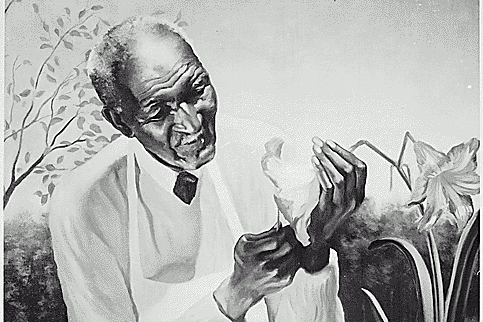
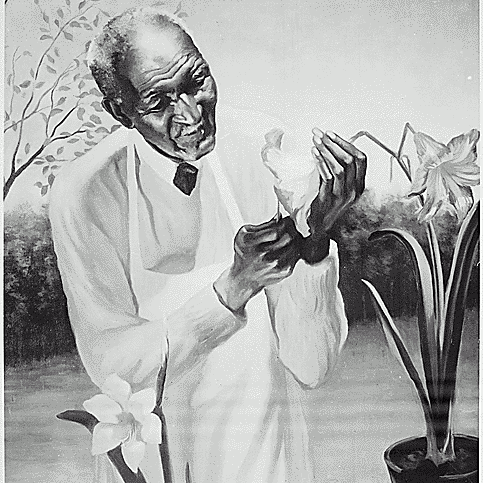
While plenty of attention shines on the likes of Larry Fink and Jeff Bezos for their climate action tactics, there is no shortage of activists who are making a huge difference day to day when it comes to our relationship with the environment. But many of these leaders don't benefit from vast media coverage. Being that we’re in the third week of Black History Month, we at TriplePundit thought we’d highlight these black heroes whose environmental and community work has left a huge impact not only on the black community, but also society at large.
By all means, this is far from an exhaustive list, yet we thought these five visionaries deserved to be recognized.
Rose Brewer: A professor of Afro-American and African studies at the University of Minnesota, Dr. Brewer writes about environmental racism, notably how toxic waste dumped into poorer communities has left behind health and social problems for decades. Her work has included leadership roles in the Environmental Justice Advocates of Minnesota (EJAM), an advocacy group that takes on the disparities that result from environmental injustice.
Many writers have referred to Dr. Robert Bullard as the “father” of the environmental justice movement. The title dates back to his research in the 1970s, which revealed the correlation between black neighborhoods and the location of garbage dumps. His 1990 book, Dumping in Dixie, was instrumental in bringing the civil rights and environmental movements closer together.
George Washington Carver (shown above in a portrait by U.S. artists Betsy Graves Reyneau): Yes, we already know a lot about this revered scientist thanks to his research on alternatives to growing cotton (as in peanuts), as well as his work to prevent soil depletion. But did you know Carver also wrote extensively on the risks associated with relying on monoculture crops, looked at nature through the lens of biomimicry before the word became part of our lexicon, and was averse to any process that resulted in waste?
A nurse by profession, the late Barbara Hillary is largely credited as being the first black woman (and oldest person) to travel to the North and South Poles. She also founded the Arverne Action Association, which strived to improve the quality of life in her Far Rockaway neighborhood of Queens, New York. Her time in both polar regions, along with a trip to Outer Mongolia during the last year of her life, drove her to become a climate change activist.
Savonala “Savi” Horne: As Executive Director of the Land Loss Preservation Project, Horne and the organization she leads provide legal support and assistance to financially distressed farmers and landowners across North Carolina, including the most vulnerable African-American rural communities. This group also works to help farmers transition away from growing tobacco, promotes sustainable agriculture, and boosts responsible forestry efforts.
From the weekly Brands Taking Stands Newsletter: Be sure to subscribe!
Image credit: U.S. National Archives